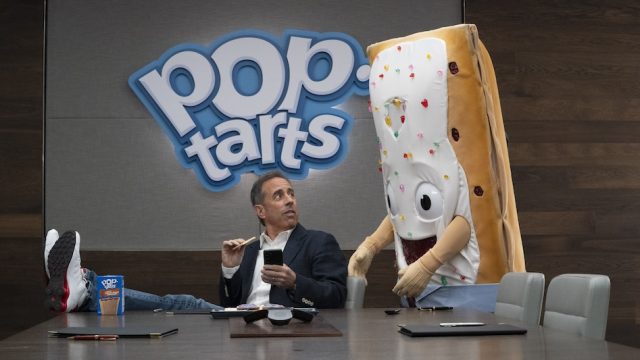Read about popular things like:
- big streamers
- big theaters
- the northeast
- a late legend
- obsession!
Thanks to the always-popular Miller for contributing this week. Send articles throughout the next week to ploughmanplods at gmail, post articles from the past week below for discussion and Have a Happy Friday!
For Fast Company, A.S. Hamrah considers “Unfrosted” in the context of other product-worshipping films:
It’s a movie that perfunctorily and even brutally catalogues and dismisses everything that was supposed to be good and true in movies like Air. It does what none of those movies could do in this time of precarity and gig work: It identifies clichés, using them to mock and dismiss the idea that any of this is worth anyone’s time, including watching this movie… In contrast, how could so many clichés be packed into such a small group of films in just one year, all of which say the opposite of Unfrosted? Made separately by different producers for different studios, Air, et al., each cover the same ground the same way. Whether they end in success or failure, whether they have a satirical element or are earnest and sincere, they are all “hugging and learning” movies instructing viewers about how to succeed in business while trying very hard indeed.
The Fall Guy misses modest expectations. At ScreenCrush, Matt Singer wonders what audiences are looking for:
I try not to get to wrapped up in the box office results of any movie. It’s a losing game, and it ultimately has nothing to do with my personal enjoyment of a film. A movie is a lot more than what it earned on its opening weekend. If a film breaks box-office records, that doesn’t make it good or bad; that just makes it successful. The opposite is true as well. Plenty of movies even better than The Fall Guy flopped much harder than it did in its opening weekend. In the end, a movie this entertaining will find an audience one way, or another.
At his substack, Damon Krukowski screens a double feature of documentaries tied to New England music scenes, and the philosophies they reveal:
[Artist Michael] Townsend, together with a small collective of fellow artists, fought back by secretly moving into the centerpiece of Providence real estate development, the Providence Place Mall. They built an apartment there, in a disused space hidden within the structure. This comic tale [the documentary Secret Mall Apartment] has a very different tone than Road to Ruane, the tragic documentary about Billy [Ruane] and the culture of the Middle East [rock club]. Rather than “arch, smart, poisonous,” the artist collective around Michael Townsend was positive and industrious. While building their secret mall apartment, they were also hard at work making tape art murals for a local children’s hospital, and in Oklahoma City and New York in honor of those killed there by terrorism. These are artists engaged with the outside world – the opposite of decadent.
Rosecrans Baldwin’s Meditations in an Emergency considers when music leads to an obsession:
I don’t have a long list of things I consider sacred, but music is one, and feeling awe, which music often provokes. It’s those moments when I feel less fragmented, when I’m so wholly pulled by something that I press myself into it before memory is activated, before the thing feels past. The inciting thing, person—is this how significance foments?
And Jeremy Gordon recalls interviewing the late Steve Albini at The Atlantic:
Albini did too much to be neatly summarized in any profile; I didn’t have the space in mine to dive too deeply into his most recent band, Shellac, which in a terrible coincidence is releasing a new record next week. But as I drafted, two things kept coming back to me: The first was that Albini had been unafraid to own up to his past rather than wave it off or double down on his positions. The second was that he talked about music not as some expression of ego but as a creative practice worth maintaining because it enriched your life. To hear this—and in such an unpretentious way—was no small thing. This was not mere plate-spinning from a guy who liked to hear himself talk; these were tightly reasoned, directly stated beliefs that he’d stress-tested in his own life and were reflected in how he carried himself.

